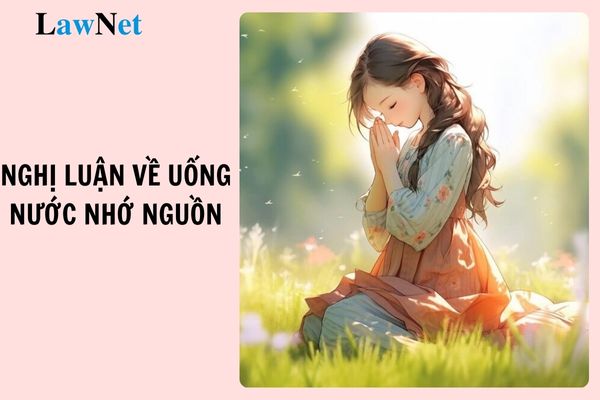|
Newest sample argumentative essays on the proverb "Be grateful for what you have"
Sample 1:
The Vietnamese nation has long possessed a tradition of loyalty and gratitude. This is evident in the gratitude shown toward those who have contributed to us, those who have made great efforts for us. To ensure eternal remembrance "etched into memory," our ancestors cleverly distilled and passed down significant meanings through the proverb "Be grateful for what you have."
This concise proverb seems to encapsulate lessons on moral living and the noble sentiment of Vietnamese people. Whenever we enjoy a sip of pure water, we must not forget the source—the origin of the water. Indeed, using familiar characteristics of folk to convey lessons and teachings about human gratitude. To achieve the life results we have today, none of us should forget those who provided us with prosperity and happiness.
The tradition of "Be grateful for what you have" has been integrated into life itself, becoming a beautiful quality in the Vietnamese people's character. This is seen in the worship of ancestors during Tet holidays, memorial days. During these days, descendants gather, converse, and burn incense in tribute and gratitude to our ancestors. As Vietnamese people, none can forget the Hung King's Day to recall the heroic deeds and merits of national heroes. They brought us the progressive life we enjoy today. We must act according to the beloved leader Ho Chi Minh’s words, "The Hung Kings founded the nation; our generation must protect it." Thus, our people sing:
No matter where you go
Remember the Hung King's Day, the tenth of March.
To have today's prosperity, our forefathers also had to shed sweat and blood to maintain the nation's peace. We still hear about the soldiers of Uncle Ho, the young women of Truong Son who once sang:
Carving through Truong Son, we went to save the nation
Our spirits soaring towards the future.
The previous generation faced difficulties without regard for their lives to protect our country. We—the young generation living in freedom—must remember those who have fallen. However, there are many young people today who take freedom—which once required great sacrifices—as air. How lamentable this is. A nation cannot lose its history. The youth must understand history, not just know but truly grasp it. Through historical knowledge, we gain pride and gratitude for those before us, strengthening our resolve to live up to past generations' expectations.
Expressing gratitude honors national heroes and the teacher-student tradition. Around November 20—Vietnamese Teachers' Day—a familiar proverb arises, "One word from the teacher equals a half word" and "Without a teacher, you cannot accomplish" to highlight the ocean-like contributions of educators. Thus, November 20 is when students and past generations recognize educators' contributions. Gratitude might also manifest in passionate learning and good results, and for former students, in success.
Speaking of gratitude, one must mention parents' sacrifices. Mothers endure nine months of labor pains. Fathers tirelessly care for their children. Around us are countless non-breathable things that deserve respect and gratitude. Remembering those who brought us comfort becomes an innate trait, embedding itself in our living and thinking, and reflecting our nation's good qualities.
The proverb "Be grateful for what you have" reminds us to honor past generations for creating our success today. Though they may have departed, their achievements remain, to be preserved and promoted by us. Continue their accomplishments for future generations!
Gratitude is a noble virtue and a hidden beauty passed down through generations, always preserved and exalted. Numerous folk songs and proverbs were crafted to express this, including the familiar proverb "Be grateful for what you have."
This short proverb carries profound significance, not merely addressing the literal: the origin of life-giving water. Each time we use this water, we quietly thank nature for this valuable resource. Moreover, it's our ancestors' message to their descendants: Remember the generosity, the feelings, the actions of those who supported us and sacrificed for our well-being. This enduring value lays the foundation for strong social relationships.
Within each of us, no success arises spontaneously without someone else's efforts. This work might be simple encouragement or guidance, or perhaps economic support as a stepping stone for advancement. Though it appears simple, this connection forms pivotal moments in our lives.
No birth occurs by chance; it's thanks to parents' nurturing and upbringing. Without parents, we wouldn't exist; thus, parental gratitude must be deeply remembered, not merely in memory, but by fully repaying them. As adults, we could show appreciation by gifting parents something meaningful. When parents are elderly and frail, providing strong support is a form of repaying their grace. No grand gestures are needed, for simplicity suffices in expressing filial piety.
Within the family. What about society? Teachers who guide us, inspire dreams in our education, must not be forgotten. Simple actions like sending warm messages on Vietnamese Teachers' Day, or presenting bouquets and heartfelt notes, bring smiles and forge bonds. These small gestures have deep, humanistic value. We must never forget those who sacrificed much, even part of themselves, for our national freedom and peace. This is what July 27—National Tribute Day—represents: honoring heroic Vietnamese mothers and martyrs who sacrificed to protect our country.
Yet, in reality, some have discarded this ethos, betraying those who supported them, "eating porridge, discarding bowls." These selfish individuals, self-centered in thought, will face consequences for ingratitude.
Ultimately, the proverb "Be grateful for what you have" teaches gratitude toward benefactors. Its humanistic nature urges the preservation and promotion of this wonderful tradition, creating a more civilized, courteous society, contributing to the nation’s prosperity.
|


